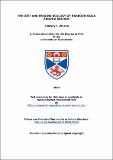The diet and feeding ecology of harbour seals around Britain
Abstract
Since 2000, there has been a marked decline in the number of harbour seals in some regions around Britain; one possible contributing cause is competition for prey with sympatric grey seals. To explore one important aspect of this interaction, in this thesis the diet of harbour seals is estimated using analysis of hard prey remains recovered from faeces and compared with equivalent results for grey seals. To estimate coefficients to account for partial and complete digestion of hard prey remains, 100 whole prey feeding trials were conducted with six harbour seals and 18 prey species. Differences were found among prey species and between harbour and grey seals highlighting the importance of applying predator- and prey-specific digestion correction factors when reconstructing diet. In a comprehensive exploration of the diet of harbour seals around Britain, sandeel and flatfish dominated in the North Sea and large gadoids dominated on the Scottish west coast with seasonal pulses of pelagic prey. Variation in diet was linked to regional and seasonal differences in prey distribution and abundance. Sex-specific variation in harbour seal diet was examined in four regions. The main difference detected was in The Wash, where female diet quality was significantly higher than males in winter, which appeared to be driven by greater consumption of pelagic prey by female seals associated with seasonal energetic requirements of their annual life cycle. Comparison of the diet of harbour and grey seals revealed regional differences in diet composition, diversity and quality between the two species. However, there was no consistent pattern in this variation in relation to regional variation in harbour and grey seals population trajectories and no clear evidence for interspecific competition for prey. Future work should focus on an integrated investigation of prey abundance and distribution, and seal diet and foraging behaviour/distribution.
Type
Thesis, PhD Doctor of Philosophy
Collections
Items in the St Andrews Research Repository are protected by copyright, with all rights reserved, unless otherwise indicated.

